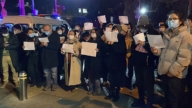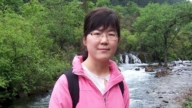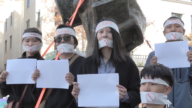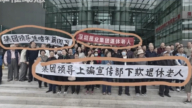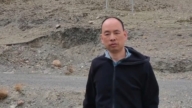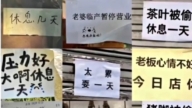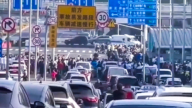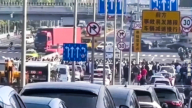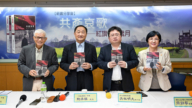【新唐人2013年11月12日讯】台湾海峡两岸国、共两党,11月10号分别举行会议。台湾国民党第19次全国代表大会,与中共十八届三中全会同一个时间召开,虽然国、共双方保安都很严密,但国民党全代会会场外的“万鞋齐发”,和北京三中全会举办地“京西宾馆”外的草木皆兵,形成强烈反差。有评论认为,在台湾的民主机制下,老百姓拥有集会抗议的权利,而国民党遭遇台湾民众“用鞋投票”的抗议,“令共产党感受到的恐惧,不亚于当年苏共垮台。”
中共十八届三中全会的会议地点,是隶属于中共军队总参谋部的“京西宾馆”,地处军事博物馆、国防部和几个军营附近,极具军事安全性。三中全会召开期间,会场周边更是草木皆兵,戒备森严。官方媒体并没有就这次会议进行相关报导,外界认为这届三中全会为“闭门会议”。
时事评论员夏小强:“中共召开会议竟然像当年中共夺取政权前的地下党一样,偷偷摸摸的不敢见光,主要原因中共召开会议的实质并不是真正的所谓改革,本质上是中共内部的一场内讧,要完成中共内部的一场权力和利益的重新分配转移,对中国社会和民众没有任何好处。”
台湾民主基金会副执行长董立文:“中共虽然提出向政府开刀的改革方案,但这次的三中全会的召开,其实是比过去任何一次都更神秘的,整场并没有开放给媒体,也史无前例的跑到军方所开的一个饭店里面,也是躲起来开。”
与此同时,台湾海峡对岸的执政党——国民党,原定今年9月29号在台北举行第19次全国代表大会,却因为社运团体计划进行抗议活动,而延后到11月10号,并且到中部举行。
董立文:“那在我们台湾这个民主自由的社会,其实我也没想到这种事情也会发生在我们台湾,就是执政党在召开一个全会,就因为人民的反应,它逃离了,它躲开了,躲到台中去开了,结果它还是躲不掉,我觉得这就是两边,两岸最大的对照。”
国民党10号举行的全代会当天,会场外大批不满的示威群众朝封锁区内丢鞋,象征人民“用鞋投票”,来抗议国民党主席马英九所领导的台湾政府。
夏小强:“国民党开党代会遭到万鞋齐发,表明民众对执政党的不满,国民党只能通过改变施政中的不当和失误,来换取民众的认同支持。相反,中共这样的独裁政府和民众的根本利益是根本对立的,中共面对访民的上访和抗议,采用的是抓捕、关押和迫害。”
根据日本《时事通讯社》报导,中共十八届三中全会虽然讨论全面深化改革,但大陆的社会弱势民众已对官员贪腐和司法不公愤怒到极点。报导说,三中全会开幕时,在北京西城区的监察部外,出现了超过1000名来自全大陆上访民众的示威场面。
《时事通讯社》认为,在三中全会开幕当天的戒严状况下,仍有如此大规模抗议行动,实属意外。而访民透露,他们是透过网路和手机互通邮件,来实现团结下的示威力量,如果几个人示威,马上就会被抓走,可是很多人在一起,那就有可能成功。
美国纽约城市大学政治学教授夏明:“就是中国没有保障老百姓民主抗议集会的权利,所以老百姓其实是冒着很大的生命危险。而相反的,在台湾就已经形成一个民主的机制,那么这种抗议集会,成了老百姓的根本权利。”
在台湾的“中华民国”人民不但可以合法的举行抗议游行集会,即使部分民众逾时非法集会抗议,政府也只命令警察柔性劝导。反观中国大陆,访民举横额抗议,最终遭到警察驱赶,并抓到被称为“信访集中营”的“久敬庄”关押。
采访/常春 编辑/黄亿美 后制/孙宁
Contrasting China’s Two Party Conferences:
Thousands of Shoes, Thousands of Police
The Chinese Nationalist Party, or Kuomintang (KMT)
in Taiwan, and the Chinese Communist Party (CCP)
in the mainland are divided by the Taiwan Strait.
On November 10, the Taiwan KMT 19th National
People’s Congress opened at the same time
as the CCP 18th Third Plenary Session.
Both have tight security control measures.
Outside the KMT conference hall, protestors
threw thousands of shoes in demonstrations.
This was in stark contrast to the atmosphere outside “Jingxi
Hotel", where the CCP Third Plenary Session was being held.
Protesters were met with violence and arrests.
Commentators believe that, under Taiwan’s democratic
institution, people have the right to protest, and the KMT
suffered from Taiwanese people “voting with shoes".
The fear felt by the CCP is no less
than when the Soviet Union collapsed.
The 18th Third Plenary Session’s meeting
place is Jingxi Hotel, which belongs to the
CCP military General Staff Headquarters.
The hotel is close to the Military Museum, the
Defense Department and several military barracks.
During the session, the area surrounding the
hotel was heavily guarded, with a tense atmosphere.
Chinese state media did not report about the meeting,
and internationally appears to be a “closed-door" meeting.
Xia Xiaoqiang, Political commentator:
“This meeting resembles the underground
nature the CCP took before it seized power.
It is very sneaky and afraid of light.
I think the main reason is that the meeting
isn’t about reforms, but rather about infighting.
It is to complete a redistribution of
power and interests within the party.
This is not beneficial at all to Chinese society or it’s people."
Dong Liwen, Deputy Executive Director, Taiwan
Foundation for Democracy: “The CCP has proposed a
reform plan that points a knife towards it’s governance.
However, the Third Plenary Session
could not be more mysterious.
It is not opened to the media, and is also being
held in a military hotel, where they hide away."
Across the Taiwan Strait, the KMT National
People’s Congress was postponed.
It was moved from September 29 to November 10.
This was due to planned protests by social movement groups.
The meeting venue was also changed to central Taiwan.
Dong Liwen: “I did not expect to see this happen
under Taiwan’s democratic and free society.
The ruling party escaped and hid in the middle of Taiwan.
This is because of people’s reaction,
and in the end it could not escape.
I believe this is the biggest contrast
between Taiwan and China."
On November 10, when the KMT held it’s
congress, a large number of people
were throwing shoes into restricted areas.
This is a symbol of people “voting with shoes", to protest
against the KMT Chairman Ma Ying-jeou’s government.
Xia Xiaoqiang: “When the KMT was met with thousands
of shoes from protestors showing their dissatisfaction, it can
only change it’s mistakes in order to gain public support.
On the contrary, when the CCP dictatorship
meets with protestors and petitioners, it reacts
by arresting, detaining and persecuting people."
The CCP discussed comprehensive deepening
of reforms ahead of the Third Plenum being held.
However, the anger felt by socially vulnerable
people towards corrupted officials and judicial
injustice have reached breaking point.
The report says that at the closure of the session, more
than one thousand mainland petitioners protested outside
the Ministry of Supervision in Beijing Xicheng district.
“Jiji Press" highlights that even under strict controls during the
opening of the session, there were such large scale protests.
Petitioners revealed that they communicate through the
internet and mobile phones to unite and gain strength.
If there are only a few protesters, they could
be arrested immediately, but if there are
many people protesting, it may succeed.
Xia Ming, Professor of Political Science, New York City
University: “Because China does not protect people’s
right to protest, people actually risk their lives to do so.
In contrast, Taiwan has formed a democratic system,
so protests and rallies have become people’s basic right."
In Taiwan, also known as the Republic of China, it
is not only that people can legally protest and rally.
The government also orders the police to use persuasion.
In mainland China, petitioners who hold
banners are chased and arrested by police.
They are taken to a place called “Jiujingzhuang",
which is also known as “the petitioners camp".


